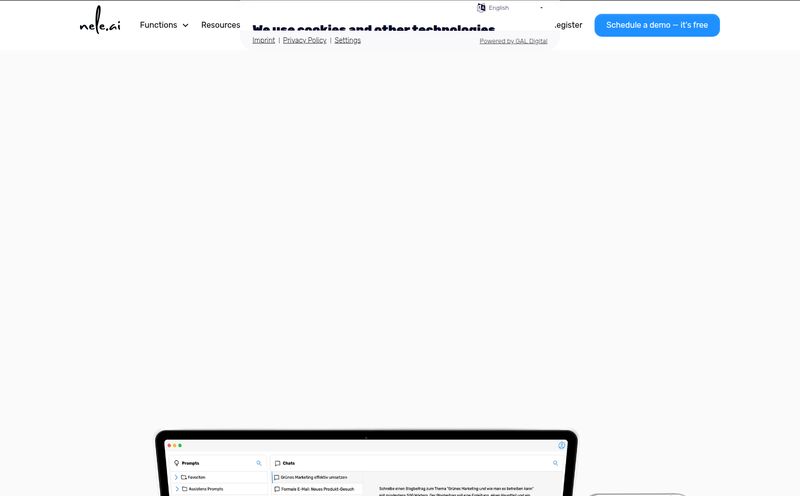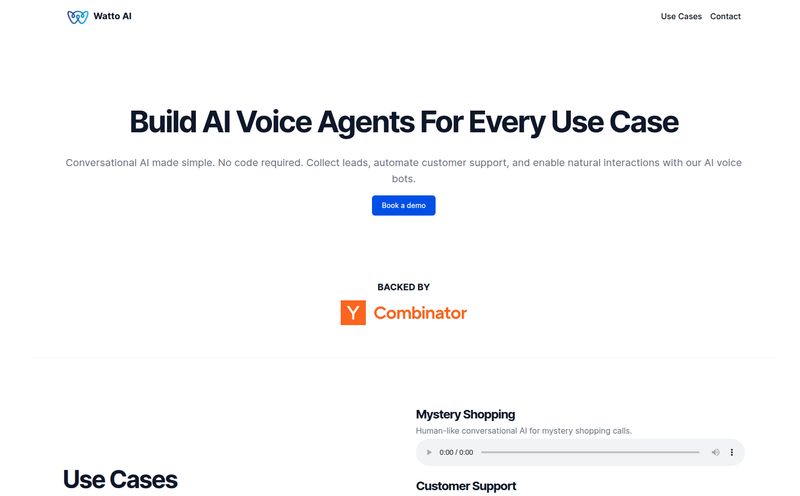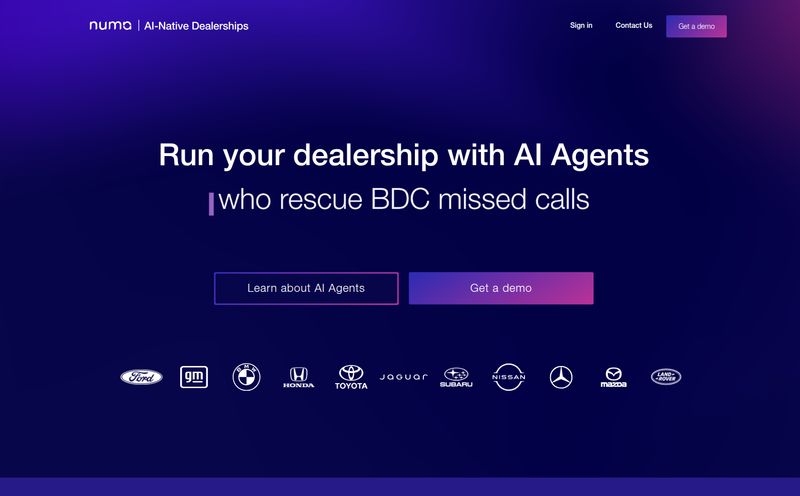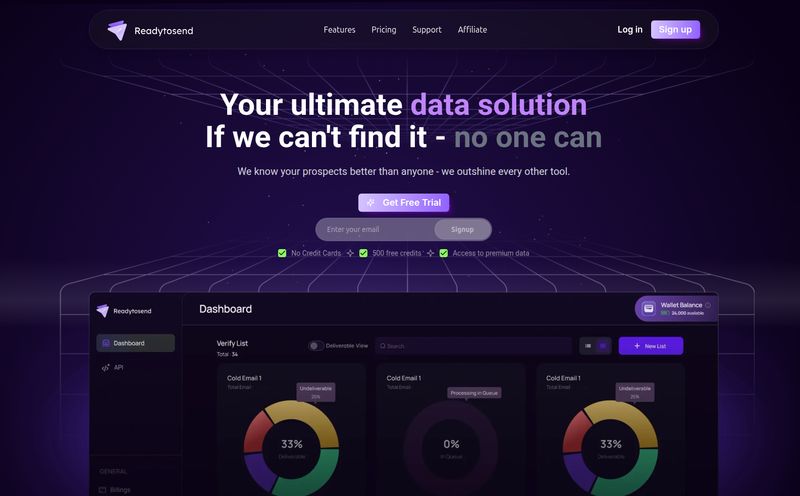Let’s talk about the elephant in every legal department. No, not the partner who microwaves fish in the breakroom. I’m talking about The Grind. The endless, soul-crushing mountain of paperwork. The constant back-and-forth on contracts, the NDAs, the compliance checks… it’s a relentless tide that can drown even the most caffeinated legal team. For years, we've been promised tech solutions, but they often feel like putting a fancy band-aid on a gaping wound. Another login, another siloed platform.
But every so often, something pops up on my radar that makes me sit up and pay attention. Recently, that something has been Platus. It calls itself an “AI-first workspace for legal teams,” and I’ve got to admit, my curiosity was piqued. Is this just another tool with slick marketing, or could it actually be the AI co-pilot that helps legal pros reclaim their time and, dare I say, their sanity? I decided to take a look.
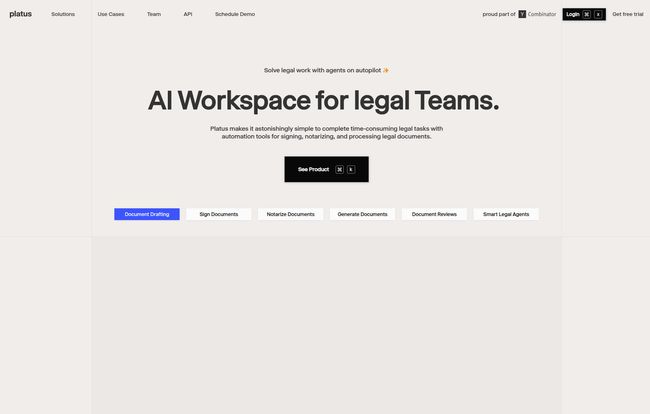
Visit Platus
So, What Is Platus, Really?
Okay, let's cut through the jargon. At its heart, Platus isn't just another document reviewer or e-signature tool. The ambition here is bigger. Think of it less like a single app and more like a central nervous system for your entire legal operation. It’s designed to connect all the disparate parts—your existing documents, your case files, your internal templates—and then layer a powerful AI over the top of it all.
The core idea is to automate the tedious, repetitive tasks that consume a shocking amount of a lawyer’s day. We’re talking about initial document drafting, reviewing contracts for specific clauses, and even handling things like online notarization. It's about building a smarter, more efficient workflow so the human experts (that's you!) can focus on the high-level strategic work that actually requires a brilliant legal mind.
The Genius Move: No-Code for Lawyers, API for Techies
Here’s the thing that really stood out to me, and it's something a lot of SaaS companies get wrong. They build for one type of user. Platus seems to understand that a modern legal team isn't a monolith. You've got the in-house counsel who just wants a simple, visual way to build a workflow, and you've got the legal ops pro or developer who wants to plug legal services directly into other business applications via an API.
Platus says, "No Code or API, You Decide." And that's brilliant. It’s like giving someone the choice between building a car with a pre-made LEGO kit or 3D-printing their own custom parts. The paralegal can drag and drop modules to create a process: “When a new sales contract is uploaded to this folder, have the AI extract the payment terms, check them against our standard policy, and if they’re non-standard, flag it for human review.” No coding needed. It just works. Meanwhile, the dev team can use the Platus API to build legal functionality right into their Salesforce or HubSpot instance, powering legal services across the whole business. This flexibility is, in my opinion, a game-changer.
The Key Features That Actually Matter
A feature list is just a list until you see how it solves a real problem. Here are the parts of Platus that feel less like fluff and more like genuinely useful tools.
Smart Legal Agents and Workflows That Think
This is the automation engine. The platform's 'Smart Legal Agents' are customizable AI bots you can set up to handle specific, repetitive tasks. The visual workflow builder is where the real magic happens. You can literally map out your entire contract review process, for example. I saw a graphic showing a flow from Document Filter to AI Extraction to Contract Review and finally to a Human Approval step. This isn't just saving clicks; it's redesigning a core business process to be faster and less prone to human error. The website boasts some wild numbers, like 20m/s document processing speeds. While I always take marketing stats with a grain of salt, the direction is clear: this is about speed and efficiency at scale.
Your Firm's Brain in an AI Chat
We’ve all played with ChatGPT. It’s impressive. But ask it about a specific clause in a contract you signed last year, and it’s clueless. Platus’s AI chat assistant is different because it’s backed by your company’s knowledge base. Your documents, your cases, your templates. It’s like having a junior associate who has perfectly memorized every single document the firm has ever produced. Imagine being able to ask, “Show me all the contracts we have with renewal dates in the next 90 days that don't include our new data privacy clause.” The time-saving potential there is just immense.
The All-in-One Document Lifecycle Hub
How many different subscriptions are you paying for right now? One for e-signatures, another for contract lifecycle management (CLM), maybe a third-party service for online notarization? Platus aims to consolidate all of that. From generating a contract based on a smart template to getting it signed and even notarized online, it's all handled within one workspace. This doesn't just save money; it reduces friction and keeps everything in one secure, auditable location.
Let's Be Real: The Potential Hurdles and Sticking Points
Alright, no tool is perfect. As an SEO and tech guy, I’m naturally skeptical. It’s my job. While Platus looks incredibly promising, there are a few things any potential user should consider.
The Onboarding Curve and AI Trust
A system this powerful isn't a 'plug and play' toy. The JSON info I saw mentions a potential need for initial setup and training, and that makes total sense. You have to feed the AI, teach it your firm’s specific rules, and integrate it into your existing processes. This requires a commitment of time and resources upfront. Furthermore, the legal industry is, for good reason, conservative. The question of “Can we really trust the AI’s accuracy?” is a big one. My take? You don't have to trust it 100%. Use it to do the heavy lifting—the 80% of review and drafting that's standard—and leave the final 20% of critical judgment to your human experts. It's about augmentation, not abdication.
Security is Not a Feature, It's a Prerequisite
When you're dealing with sensitive legal data, security is everything. The idea of putting all your firm's knowledge into a cloud platform will understandably give some IT departments pause. Any team considering Platus will need to do their due diligence on its security protocols, data encryption, and compliance certifications. This is a non-negotiable hurdle that Platus will have to clear with every single client.
What's the Damage? A Look at Platus Pricing
Here’s the million-dollar question, right? Or, hopefully, a lot less. After some digging, it appears Platus doesn't have a public pricing page. The pricing information I found was empty, and their site funnels you towards a demo request.
Don't be alarmed. This is actually very common for enterprise-level B2B SaaS platforms. It usually means pricing is customized based on factors like:
- The size of your legal team
- The volume of documents you process
- The specific features you need (e.g., API access)
- The level of support and onboarding required
Your best bet is to hit that "Request a demo" button. That's the gate you have to go through to get a custom quote tailored to your firm's specific needs.
Is Platus the Co-Pilot Your Legal Team Needs?
So, what’s the final verdict? From where I’m sitting, Platus looks like a seriously powerful tool for legal teams drowning in process and repetitive work. It’s not a magic wand that will replace lawyers—let’s squash that tired argument right now. It's a force multiplier. It's the co-pilot that handles the navigation and system checks so teh pilot can focus on flying the plane through turbulence.
If your team is nimble, forward-thinking, and ready to embrace automation to get ahead, then Platus is absolutely worth a serious look. The combination of a no-code workflow builder for everyday users and a robust API for deep integration is a truly compelling package. It addresses the needs of the entire business, not just the legal department. And in my book, that’s the mark of a truly great platform.
Frequently Asked Questions
- What is Platus in simple terms?
- Platus is an all-in-one software platform for legal teams that uses AI to automate tasks like drafting documents, reviewing contracts, and getting signatures. Think of it as a central hub to make your legal operations much more efficient.
- Who is Platus for?
- It's designed for in-house legal teams, law firms, and even businesses in sectors with heavy compliance needs like real estate. It’s for any group that wants to reduce time spent on repetitive legal paperwork and processes.
- Do I need to be a programmer to use Platus?
- No. One of its key strengths is the no-code, drag-and-drop workflow builder that allows anyone to create automation rules. However, it also offers a full API for developers who want to build custom integrations.
- Is my legal data safe with Platus?
- Data security is a major consideration for any legal tech. While Platus is built for legal teams, you should always conduct your own security review and ask for their compliance and data protection documentation during the demo process.
- How does the Platus AI work?
- Unlike generic AI, the Platus AI is trained on your company's own secure knowledge base—your documents, templates, and past cases. This allows it to provide highly relevant answers and perform tasks based on your firm's specific standards.
- How much does Platus cost?
- Platus does not list public pricing. Pricing is likely customized based on your team's size, usage, and specific needs. To get a price, you'll need to contact them to request a demo and a custom quote.
Reference and Sources
- Platus Official Website: https://www.platus.com/
